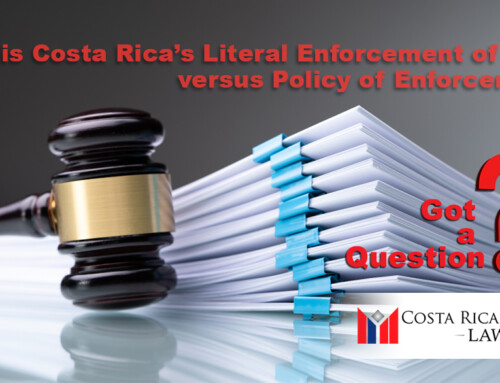How Does the Residential Renting Process Work In Costa Rica?
Renting a residential property in Costa Rica is governed, primarily, by the provisions of the Tenancy Law (Ley General de Arrendamientos Urbanos y Suburbanos). Rental Contracts are considered as being Long Term Rental Contracts. The only exception to this, is a Non-traditional Property Rental Contract for a property located in a designated touristic area of the Country, that is registered as such with both the National Tourism Institute and the Costa Rica Tax Department, and has a term of between one day and one year, in accordance with the provisions of Law 9742, “The Law for the Regularization of Non-Traditional Lodging and its Intermediation through Digital Platforms and its Regulations”. In the case of a Non-traditional Property Rental Contract, which applies to rental properties that are primarily vacation rental properties in designated touristic areas, the literal interpretation of the Contract applies and not the provisions of the Tenancy Law. However, in the majority of cases, there are significant differences in what happens in the marketplace between a landlord and a tenant, and what the Law dictates, especially in a case where a foreigner is a renter.
The Marketplace Informal Version of Residential Renting
In the majority of circumstances, landlords will have a prepared Rental Contract for a property, which at most, will follow a few of the Tenancy Law provisions. Most renters are not familiar with the Tenancy Law provisions and accordingly, accept the Rental Contract provisions as provided by the Landlord on a literal basis. So long as all of the parties to the Rental Contract are in agreement with the contract provisions as written and adhere to these provisions during the term of the Contract, with no dispute arising between the parties, then no legal issue need arise with respect to the Contract between the parties. The Remedy of Eviction of a Tenant for such matters as the non-payment of the rent, or causing excessive damage to the property, would be available to a Landlord. This is by far the most common scenario found in the Marketplace with respect to Residential Rental Contracts.
The Legal Version of Residential Renting
Article 2 of the Tenancy Law specifically provides that any provision of a Rental Contract which contravenes a provision of the Law, is null and void, and unenforceable. Article 3 of the Tenancy Law provides that the parties to a Rental Contract cannot legally renounce any provision provided for in the Law. This becomes a significant factor should a dispute arise between a landlord and a tenant, which requires the Court’s or Arbitration Board’s adjudication to settle. In the instance of such a dispute being presented to the Court, the Court will strictly apply the provisions of the Tenancy Law. Some of the basic provisions of the Tenancy Law include the following:
1. The Rental Contract term is for a minimum of three years, regardless of the term agreed to by the parties in the Contract. Art.70
2. A tenant may terminate the Contract term on the providing of three months prior notice to the landlord, without penalty. This term of notice may be varied by the parties in the Rental Contract and the Court will respect the notice variation agreed to in that regard. Art.72
3. There is no rent payment increase permitted during the Contract term if the rent is paid in U.S. Dollars. An annual cost-of-living increase is permitted if paid in Colones. Art.67
4. A tenant may only be evicted during the Contract term for non-payment of the rent or by causing excessive damage to the property. Arts. 44 & 58
5. Payment of rent is monthly, unless specifically specified otherwise in the Rental Contract, and may be paid within seven calendar days of the date specified for payment in the Contract. Art. 58 Having written rent payment receipts from the Landlord, or bank deposit receipts for a bank account specified in the Rental Contract, are important for a Tenant to enforce their Rights, should a dispute arise.
6. The Security Deposit may not exceed the amount of one month’s rent payment. Art.92
Residential Rental Property Investors Beware
The application of the provisions of the Tenancy Law becomes particularly important when a property owner wishes to sell the investment property which is rented. If the Rental Contract for an existing tenant contravenes the provisions of the Tenancy Law as to the minimum rental term, a tenant may choose to exercise their legal right to remain in the property for the balance of any legal rental term remaining. This, of course, could have the affect of limiting the ability to sell the property to either another property investor, or to a purchaser who is not willing to wait for vacant possession of the property at the end of the tenant’s legal rental term.
Another little known provision of the Tenancy Law, is that if the landlord does not provide three months prior notice before the end of the legal contract term to the tenant, that they do not intend to renew the Rental Contract, the Rental Contract will automatically renew, by operation of law, for a further rental term of three years, on the same terms and conditions, including the same rent payment amount if paid in U.S. Dollars. Art.71
My Opinion
The Costa Rica Tenancy Law is not well understood by either landlords or tenants. Many other unique provisions of the Tenancy Law exist in addition to those mentioned in this Article. My advice is that all parties seek competent and independent legal counsel, prior to entering into any Residential Rental Contract.






